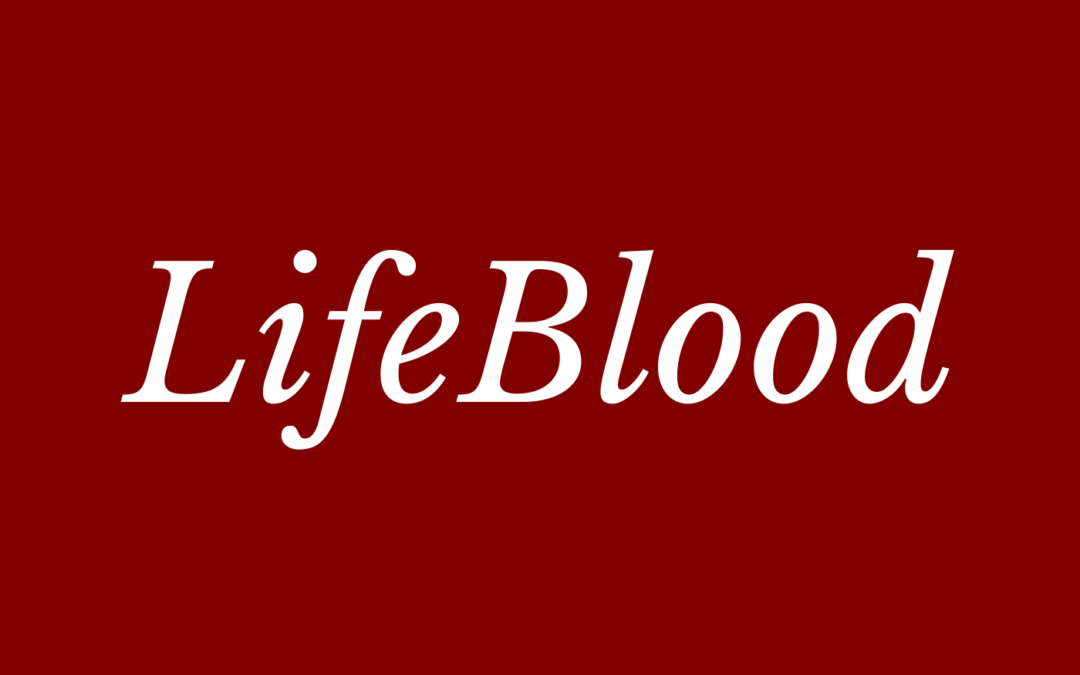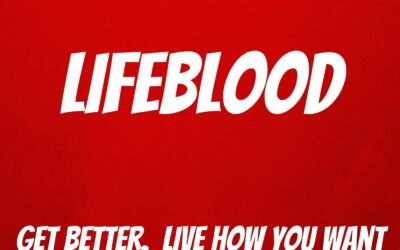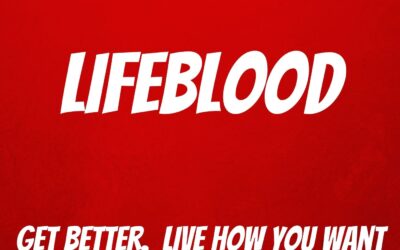Healthy Brain Food with Karen Mayo
Is the food you eat healthy brain food, or the opposite? Karen Mayo talks about how to know and what to do once you know which foods are right for your body!
Listen to us On
About the Episode
LifeBlood: We talked about healthy brain food, what our brains are made of, which foods help and which hurt, how to determine the best diet for you, and how to get started with Karen Mayo, best-selling author, Certified in Integrative Nutrition, Amen Clinic brain health practitioner and Health and Wellness Expert.
Listen to learn how taking smaller bites can have a big impact!
You can learn more about Karen at KarenMayo.com, Facebook, Instagram and LinkedIn.
Thanks, as always for listening! If you got some value and enjoyed the show, please leave us a review wherever you listen and subscribe as well.
You can learn more about us at LifeBlood.Live, Twitter, LinkedIn, Instagram, YouTube and Facebook or you’d like to be a guest on the show, contact us at [email protected].
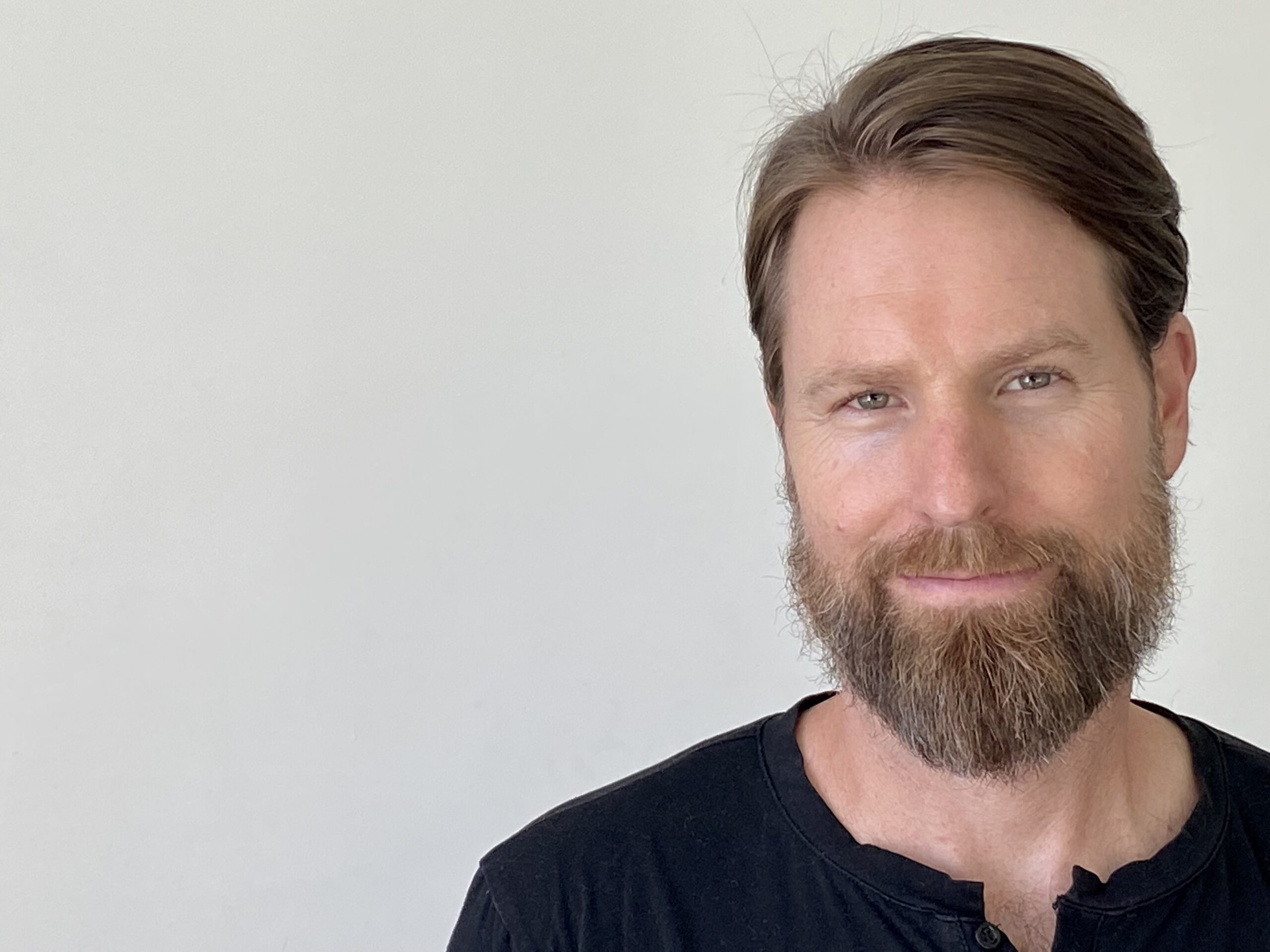
George Grombacher
Lifeblood Host
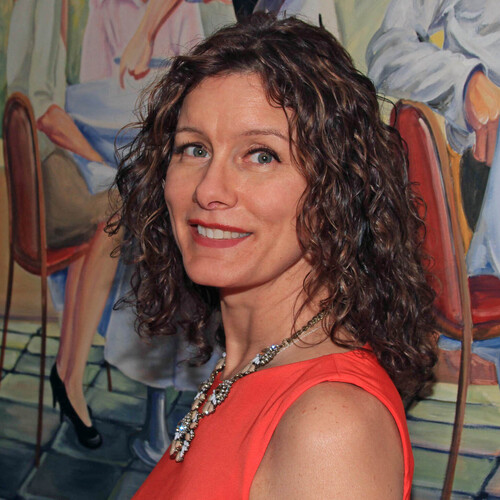
Karen Mayo
Guest
Episode Transcript
george grombacher 0:00
Come on
strong the powerful Karen male has returned to lifeblood. Welcome back, Karen. Thank you so much, George. So excited to be here today. excited to have you back on. Karen is an award winning international best selling author. She’s certified Integrative Nutrition, brain health by the Amen Clinics. She’s a health and wellness expert. Karen, tell us a little about your personal life some more about your work and why you do what you do.
Karen Mayo 0:39
Whoa, okay, so my personal life, I love to cook, I love to talk about food, I love eating food.
So more about my work and why I do what I do. Well, my work is definitely a divine intervention, everything I do is for the glory of God. It’s that feeling you know that you get done in your belly, when you know that you’re just
And I think I do what I do, because I I just love the transformation that I see. Even with my friends and family, you know, they always come and ask me questions. You know, I have a migraine, or, you know, I’m trying to lose that, you know, that last 10 pounds or five pounds or whatever it is. And
you know, when it happens, and they call you up and say I did it? And that’s really why I do what I do. It’s so amazing. To see people’s lives transformed.
george grombacher 1:52
Yeah, I appreciate that. That is, that is a pretty incredible thing right there somebody suffering from headaches or migraine, or it’s just not, it’s not simple, but something as as simple as trying to lose that extra five pounds, which so many of us, including myself from time to time will certainly struggle with if you’re able to actually bridge that gap. That’s, that’s, that’s a very powerful thing.
Karen Mayo 2:17
Yeah, and it’s just actually tweaking what people are already eating. And when that happens, it’s, it’s like a light ball or an aha moment happens. And that’s really, really great.
george grombacher 2:30
Yeah, I appreciate that. So there’s so many different things that we can be focused on, right? If it’s a specific kind of diet, or if we’re trying to lose weight, or build muscle or whatever it might be. And then you start thinking about, okay, how do I make sure that I have a healthy heart? How do I make sure I have a healthy brain? Which is something that it’s important to me to have a healthy brain or a healthier brain or whatever. So how do you think about brain health? How does that how does that fit into your world?
Karen Mayo 3:00
Right, so being certified in brain health, and I actually, as an integrative nutritionist, I specialize in brain health. You know, it’s like taking care of the whole person, that body mind connection. Putting together a nutrition plan unique to each person’s brain can be very beneficial. Your brain actually uses 30% of the calories that you put into your body. And actually, what happens is, that those calories affect how your brain works. Your brain is also the fattest organ in your body. Did you know that? I did not. So yes, the brain is the fattest organ, it’s three pounds of fat. And that’s why the, the need for a mega threes every day is so so important. So when we eat better, our brain and our body are better. And our overall longevity, and really genetics, I mean, genetics. People talk about genetics, oh, I can’t lose weight because of genetics. Well, that’s not true, because it’s only 30% genetics. And really the other 70% Is your effect is really affected by your lifestyle choices and your healthy eating habits. Matter of fact, in the past 10 years 41% has led to the rapid rise of add ADHD, and there due to many other factors that we were just talking about, like low fat, low fiber diets, high glycemic diets, and it was also the increased use of electronics, decreased exercise, and actually the lack of sleep. Lack of sleep will increase inflammation in your body and it will inhibit your weight loss
george grombacher 5:00
It’s like this perfect awful storm, like literally, of all these, all these damaging things coming together with the crap that we’re putting into our bodies, in the form of bad food in the form of, of electronics and the lights and everything else, and then we’re not sleeping, and all of a sudden, we’re not healthy anymore.
Karen Mayo 5:19
Right? So, you know, it’s what, yeah, it’s everything that’s coming at us. And no, it did take 10 years for all this to happen. So, you know, just taking little time, just to be mindful of your electronics at nighttime, like when you’re eating dinner, just put it on silent, you don’t necessarily have to turn them off. But you don’t need to be listening to all the things and you know, or whatever, no, because it is, it’s distracting. And, you know, kids actually, you know, they say, within 10 years, the kids are going to have digital dementia, and who the heck knows what that’s gonna look like. It’s it’s really scary place that we’re in right now, actually, if we can be aware of it, and switch that. And just and just be mindful of that. We can do this, you know,
george grombacher 6:05
digital dementia, I’ve never heard that term before. It sounds bad.
Karen Mayo 6:10
It is bad. It’s very bad. You know, the kids are learning on their electronics. They’re not learning skills out in the world.
george grombacher 6:22
So that’s that that’s a whole nother podcast right there. And one worthy for sure of talking about, I really want to get back to the brain, that it’s three pounds of fat, and why not? Right? Why wouldn’t my brain be made of fat? I had no idea what it was made of before. And, and certainly, I am somebody and I can’t imagine that there’s too many people. But maybe that’s not the case. I want to be as healthy and as as sharp from a mental standpoint as I possibly can be for as long as I can be. And is there a reason that that camp that that that shouldn’t be the case?
Karen Mayo 7:02
No, I mean, to be honest, Alzheimer’s actually starts decades before it’s even diagnosed. So you have to start now, if you have a history of, you know, Alzheimer’s or dementia, or you had any head trauma, let’s say like accidents or playing sports, horse, you know, horse riding accidents or anything like that, car bicycle, falling down the stairs, like just any type of accident, where you’re you hit your head, you should really think about getting number one, calling me getting on a, you know, a food and also getting an appointment at the Amen Clinics. There’s so many things to do. But um, definitely start with food and supplements. No, because food can be medicine, and then also food can be poison, right? So we either can enhance our brain health, or we can, you know, give ourselves brain fog and messy moods, you know, people who are always up and down.
george grombacher 8:08
Yeah, which, which I know, I’ve certainly experienced. And I think I could probably tell you, if I put this in my mouth, here’s how I’m going to feel, you know, 20 minutes, two hours, three hours, four hours later. And I think it’s, if you want to get in a fight with somebody talk about, you know, your favorite kind of a diet if they’re the opposite, or if they don’t necessarily think that, but having does everybody’s body respond differently to different foods?
Karen Mayo 8:37
Absolutely, yes. Because every body is unique. I love that every single person is different of their makeup. And that’s what you know, there’s so much that I love about the challenge of working with different people. And that’s to figure out what bloodwork you have and to figure out what supplements you need and to figure out the food you need. So that’s, that’s the things that I love to do. I’m like putting together a puzzle. Like I have all these puzzle pieces. And, and also, you know, with eating healthy brain and cognitive function is so much better. Who wants to walk around and brain fog? Not me. Know, a lot of people do. And health is our greatest wealth that we have.
george grombacher 9:28
Yeah, I really, I. I mean, at some point, it is a conscious choice, at least from my perspective that I am choosing if I’m exercising, or if I’m eating, and if I’ve just conditioned myself to only eat crap, and this is just the way that I’ve been feeling for a long time. I maybe just don’t even realize that I could be feeling considerably better.
Karen Mayo 9:54
It’s true, because once you start feeling so much better, and you won’t even Like it’s it’s so day and night that you don’t you won’t want to feel bad you won’t. I mean, yeah, so it’s about living right? It’s not about dieting. That’s my slogan. It’s not about dieting. It’s about living. But yes. So you have to live right so all the holidays, you know, epi birthday, everything. Yes Have a piece of cake. But you don’t really honestly stay away from the corn, canola, the fried. That is the number one, one of the number one foods or even stuff that you fry that will lead to heart disease and, you know, blocking of the arteries that Canola is so bad. So bad.
george grombacher 10:45
So it’s just that’s a type of vegetable oil.
Karen Mayo 10:49
Yes, yeah. But people thinks it’s vegetable oil that so good for us. And it is number one genetically modified and is so bad for us. So just because it says vegetable oil doesn’t mean that it’s good for us.
george grombacher 11:03
Yeah, that’s so interesting. Right there. I guess I never I never really thought that. That when I see vegetable, I think Oh, good. Healthy. And how would oil from a vegetable? How would that not be bad? But to your point? It’s the worst?
Karen Mayo 11:17
It’s the worst? Yeah, absolutely. Yeah. Corn. And I mean, we can go down the line. Soybeans is another one. It’s a it’s one of the processed and genetically modified foods. So that’s another one. So I beams are not healthy. But they’re not.
george grombacher 11:38
They absolutely are not. So you. You mentioned blood work. So I guess I’d love to hear how do I figure out that let’s just say I call you or email you? I say Hey, Karen, my name is Georgia, her John, this podcast, I’m interested in figuring out what foods are right for my body, I want to develop the you know, this is the most important thing, one of the most boring things that can do I’m ready to take ownership of this. How, how do we figure this out?
Karen Mayo 12:08
Sure. So um, well, I would love to get the blood work from you from your doctor. Or you can do your most recent blood work through Amen Clinics, or you can go to quest, or however you want to go through whoever and then we will go through your blood work. And I will, we will read it, you will understand what that means and what the solution can be. Then we work with your doctor to get all of that done.
george grombacher 12:37
Okay, so I can just reach out to my primary care physician and say, Hey, I’m trying to put together a custom meal plan. Can you share with me? My, my most recent bloodwork, and just correct. And that’ll give you what you need?
Unknown Speaker 12:54
Yes.
george grombacher 12:56
Got it fascinating. And that’s just your training and your ability to look at everything and say, Oh, look at that. George really responds well, or he needs what just just just just from there, how do we figure that out? Or?
Karen Mayo 13:11
Yeah, so the some blood work. And then also, you know, just even looking at certain factors of the blood work. I’m able to that. So I’m certified in reading blood work and also genetics and DNA.
george grombacher 13:27
Okay, and so what what is it kind of boiled down to is it say 30% of your diet needs to be fat, you know, 60% needs this we we need to be supplementing with these minerals and these vitamins has gotten to that level.
Karen Mayo 13:44
Yeah, sugar as it grows to even protein levels, right. So high protein, medium protein, low protein, well, no one’s really low protein, but unless you’re unless you have blood work, that’s really outrageous. But um, yeah, so it’s a difference of carbohydrates to fat to protein.
george grombacher 14:02
Got it? carbohydrates, fat and protein. And,
Karen Mayo 14:10
okay, and I say that the carbohydrates obviously, are simple and complex. So simple is the sugars and the complex is our vegetables, and other carbohydrates.
george grombacher 14:22
So I should have what 30% sugar just kidding.
Karen Mayo 14:30
No, George
george grombacher 14:32
0% sugar.
Karen Mayo 14:35
Now, that’s not true. So, you know, like fruit has sugar in it, but those are natural sugars, right? So we all know what natural sugars are. It’s the added sugar. It’s the sugar that you can’t read on labels. And that’s a whole nother podcast by the way, the 40 gazillion names of sugar and what they do
george grombacher 14:56
you know, you are obviously immersed in this world. I don’t know that I knew up until probably fairly recently that, that what, what you just said is, is you kind of take us obvious, that’s not necessarily obvious to a lot of people knowing that the sugar that comes from a glass of orange juice, that’s not necessarily a good thing, either. But so yeah, I think we should do an entire podcast on just how to understand sugar. And to be again, mindful of it. So and then how, I mean, once once I know here, here’s the breakdown of my carbohydrates, my fats, my proteins, do you then helped me put together just the actual different meals? Or does it depend on what I what, what what a person wants?
Karen Mayo 15:44
Yeah, so um, so I don’t like to limit people. I don’t like to limit any my clients. But yes, so we’ll go through, we’ll go through what you like to eat. And, again, it’s not about dieting, it’s about living. So if there has been happens to be something that let’s just say, pizza, and who doesn’t love pizza, right? I love pizza, too. But you know, it’s on the weekend that you have it, and you have it with a salad. So, good. Green salad with your pizza will save you so many. Let’s say calories, because what happens is the greens and the salad helped to oxidize the stress that the gluten or the pizza, and the cheese and everything else is putting on your body. So actually is preparing your body to help break down the the gluten and the fat, the carbohydrate in in the pizza. So yes, you can have pizza, but have a salad with it. And the science is behind that too. So and that’s another thing I love because I’m a total science nerd. I love to learn about what food does to our body and also how it interacts with the other food that are in that’s in our body as well. So I like I scan. I just I love food. I’m a science nerd. So I just I love that.
george grombacher 17:08
Yeah, I think that that’s cool. And and when you say it like that it’s obvious. But otherwise, I think a lot of the time, we probably think about me, I think about just food in different silos. And I don’t think about them all interacting together when I’m eating a piece of pizza and a salad I think, okay, I guess it’s good to have salad and oh, I know, I like pizza. But in fact, when I put those in my mouth at relatively the same time or the same meal, that there’s something going on.
Karen Mayo 17:39
Yeah, sorry. It’s,
george grombacher 17:41
it’s Yeah. So the more we can educate on that, and obviously, the whole goal here is optimizing my overall health so I feel good, but then also helping my brain get healthy. Can I can I, for lack of a better term make my brain healthier?
Karen Mayo 17:58
Yes. Yes, you can. It’s never too late. I’m so healthy that. So. So let’s say nuts, not butter, coconut, avocado, you know, all of olive oil. All of not all of those nice healthy fats. Mediterranean diet is really good. So that’s the all of the olive oil, the fish, your vegetables. So that’s an all around kind of Mediterranean living eating.
george grombacher 18:39
Yeah, so the more healthy fats, my my brain wants that.
Karen Mayo 18:43
Your brain is actually craving that. And the Omega threes too. So a little chip on the Omega threes. If you happen to get omega threes like fish oil or whatever, and you’re burping that up your bottle of mega threes or your bottle of fish oil is rancid. Throw it away. Don’t buy so you should never burn up fish. That is that there’s no no Yeah, never give up fish. You need a good brands. You can go to brain MD calm. And Dr. Ayman has a formulation that is formulated for your brain. Nice.
george grombacher 19:27
So that’s fascinating. And I’ve heard that before that a lot of that sometimes the products that we buy are in fact, rancid that they’ve gone bad and so you know when you’re burping and you’re getting that fish taste, which is gross and nobody wants that anyway, but that’s a surefire sign that your that your product is bad.
Karen Mayo 19:48
Yes, absolutely. And just be careful to there’s a lot there are a lot of places that have vitamins on their shelves for a gazillion months. And we don’t know if they’re good or bad. So just because Careful where you get your supplements from. Because just because you’re putting them in doesn’t mean you’re actually getting the nutrition
george grombacher 20:08
out of them. Yeah, that’s a whole nother thing too. Is this actually absorbing into my body? So is that a function of the actual food itself, but then how I’m preparing it is it all of it, that it’s getting actually delivered into my, where it needs to go?
Karen Mayo 20:24
Right. So that’s another whole nother podcast, just so you know, the short of it is just to make sure that you’re eating slow, you’re chewing properly, you know, slow down eating and chewing. So when you’re chewing at least 20 times, or 30, I’m going to say 20. Just because it’s probably doable for 30 is better, but it’s not so doable. So but when you’re chewing, you’re breaking down, obviously the food so the food then is able to get into your you know your body because it’s broken down smaller, and your saliva and enzymes are actually able to absorb it when it goes down through your your stomach, your small intestine, and then it gets absorbed and then moves down through. So yes. Chewing taste your food. Make sure you’re getting good supplements. And yeah, I’m not going to talk about that right now. But
george grombacher 21:29
But yeah, no, I love that. And it’s possible that there’s a lot of people like me that when they eat pizza, they don’t chew at all, they just sort of adjusted immediately. So to eat 20 times. Good, good rule of thumb.
Karen Mayo 21:43
Well, that’s why the salad is good. Adding in the salad, so you’re chewing to Yes, I get it. So pizza. Yes, it’s so yummy. The sauce you just want to swallow, I get that. But slow down just a little bit or take smaller bites. You know, really enjoy your pizza. And you probably will eat less smaller brain fog the next day.
george grombacher 22:07
I like it. small bites. That is how we eat elephants and how we should be eating pizza and tackling all of life’s challenges. Karen I love it. Well, I appreciate you coming back on. How can people where can people learn more about you? How can people connect with you?
Karen Mayo 22:27
Sure. Um, my website, which is Karen de m.com. Instagram, my handle is at mindful of mayo. And I have an email coach at Karen Mayo dotnet.
george grombacher 22:44
Perfect. Well, if you enjoyed this as much as I did, so carrying your appreciation and share today’s show with a friend who also appreciates good ideas, go to Karen mayo.com. Find her on Instagram at mindful mail and shoot her an email at coach at Karen mayo.net. Perfect, yes. Excellent. Well, I will list all those in the notes of the show. Thanks. Good, Karen. Thank you. And until next time, keep fighting the good fight. We’re all in this together.
Transcribed by https://otter.ai
More Episodes
How To Be a Better Communication with Dr. Sandra Folk
How To Be a Better Communicator with Dr. Sandra Folk We all want to be understood and to effectively get our point across, no matter what medium we're using. Dr. Sandra Folk shares her expertise and framework for making that happen no matter who you're communicating...
How Much Should I Save with Amanda Neely
How Much Should I Save with Amanda Neely What financial lessons can be learned from the Greatest Generation who lived through War and Depression? Amanda Neely talks about the health wisdom that is as true today as it was all those years ago, and how you can apply it...
Free Credit Check with Nirit Rubenstein
Free Credit Check with Nirit Rubenstein Over half of Americans have errors on their credit reports, could you be one of them? Nirit Rubenstein talks about a new tool that uses technology to scrub credit reports for errors and automatically goes about resolving them,...
Successful Real Estate Investing with Mark Dolfini
Successful Real Estate Investing with Mark Dolfini Could investing in real estate be the way to create the freedom and lifestyle that you're looking for? Mark Dolfini shares his personal expertise and professional expertise into how best to think about and answer...
Treating Diabetes with Noosheen Hashemi
Treating Diabetes with Noosheen Hashemi Half of Americans are either diabetic or prediabetic, what can be done to reverse this deadly trend? Noosheen Hashemi talks about how a combination of personalized tracking and AI can help people to learn how their food choices...
Understanding Carbon Credits with Anthony Milewski
Understanding Carbon Credits with Anthony Milewski You've heard of carbon credits, but did you know they're one of the key drivers for companies like Tesla's profitability? Anthony Milewski breaks down this little known industry and talks about how it's developing...
Understanding Trusts with Amanda Peck
Understanding Trusts with Amanda Peck Think trusts and estate planning fare just for the ultra wealthy? Amanda Peck talks about why that's not the case, and how ordinary folks can easily access and benefit from using them! About the EpisodeLifeBlood: We talked about...
Real Estate Syndication with Spencer Hilligoss
Real Estate Syndication with Spencer Hilligoss Interested in investing in real estate, but want something more passive than rentals or fix and flips? Spencer Hilligoss talks about the opportunities with real estate syndication, how it works and the benefits of...
Work-Life Balance with Vito Grammatico
Work-Life Balance with Vito Grammatico As a high performer, have you ever thought about why you feel burned out from time to time and what can be done about it? Vito Grammatico shares his expertise into why it happens, and some simple tools to start alleviating those...
Join the show.
Interested in being on the show? Tell me a little bit more about you and what you’d like to talk about!

